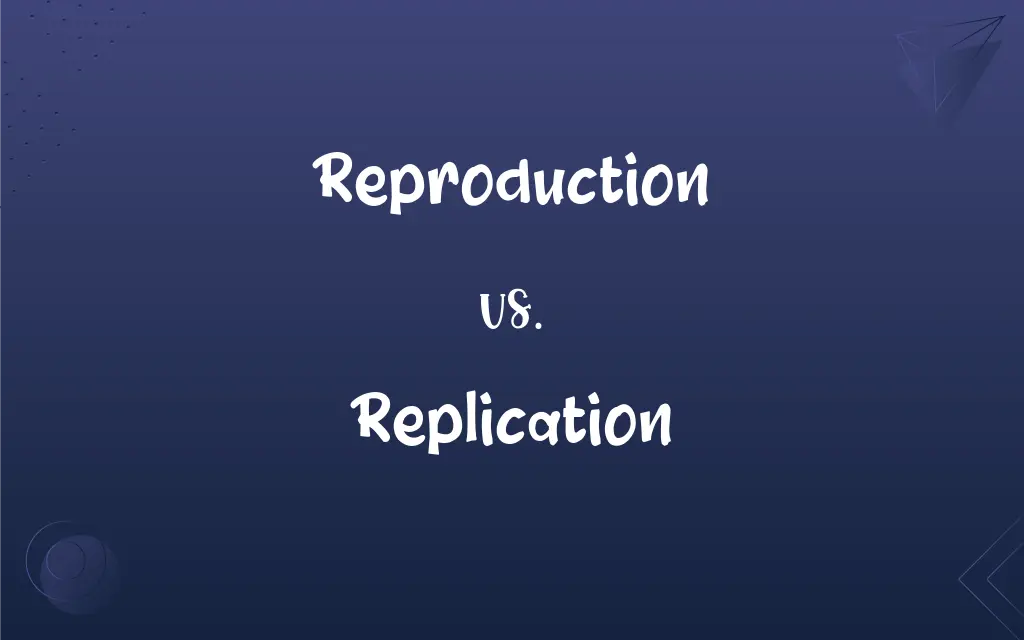Reproduction vs. Replication: What's the Difference?
Edited by Harlon Moss || By Janet White || Updated on October 2, 2023
"Reproduction is the biological process of producing offspring, while replication is the process of making an exact copy of an entity."

Key Differences
Reproduction and replication, though used interchangeably in casual conversation, refer to distinct processes in the context of biology and information technology. Reproduction is a biological process by which living organisms produce offspring, perpetuating their species. It involves the transfer or copying of genetic material to the next generation and can occur sexually or asexually. On the other hand, replication denotes the act of making an exact copy or duplicate of an entity, often referring to the copying of DNA molecules within a cell or the duplication of information or data in technology.
In the realm of biology, reproduction is pivotal for the continuation of life, ensuring that an organism’s genetic material is passed on to subsequent generations. It involves complex interactions between parental genetic material to yield offspring with varying genetic makeups in the case of sexual reproduction or identical genetic makeups in the case of asexual reproduction. In contrast, replication in biology is more specific, concerning the precise duplication of DNA during cell division, ensuring each new cell obtains an exact copy of the genetic material.
In technological and informational contexts, the term replication carries a different implication, typically referring to the creation of exact duplicates of data or information. This can be observed in database management where replication ensures data consistency and reliability across multiple locations. Reproduction, in such contexts, is not applicable as it inherently involves living organisms and the generation of life, a concept not pertinent to non-living entities like data.
When discussing the broader concept of replication beyond the biological scope, it is essential to understand that it can pertain to any act of copying or duplicating, including the replication of objects, sounds, or any other entities. Reproduction, however, retains its biological connotation and remains constrained to the realm of living organisms, defining the process by which life perpetuates and evolves through the generation of new individuals.
Comparison Chart
Definition
Biological process of producing offspring.
Process of making an exact copy of an entity.
ADVERTISEMENT
Context
Primarily biological.
Can be biological, technological, informational, etc.
Specificity
Can involve the creation of genetically unique offspring.
Involves creating exact copies.
Application
Pertains to living organisms.
Pertains to both living organisms and non-living entities.
Resultant Entity
Offspring can have unique genetic makeup.
Copies are identical to the original.
Reproduction and Replication Definitions
Reproduction
A mechanism ensuring the continuation of species.
The extinction of a species can occur if reproduction fails.
ADVERTISEMENT
Replication
A biological phenomenon for producing new individuals.
The rapid reproduction of bacteria can lead to outbreaks.
Reproduction
A biological phenomenon for producing new individuals.
The rapid reproduction of bacteria can lead to outbreaks.
Replication
The generation of new life through sexual or asexual means.
Some species have adapted to harsh environments by developing asexual reproduction.
Reproduction
The generation of new life through sexual or asexual means.
Some species have adapted to harsh environments by developing asexual reproduction.
Replication
The act of producing new organisms carrying parental genetic information.
The study of human reproduction is a crucial aspect of medical science.
Reproduction
The process by which organisms generate offspring.
The reproduction of plants can occur through seeds or spores.
Replication
The act or process of replicating something.
Reproduction
The act of producing new organisms carrying parental genetic information.
The study of human reproduction is a crucial aspect of medical science.
Replication
(Biology) The process by which genetic material, a single-celled organism, or a virus reproduces or makes a copy of itself.
Reproduction
The act of reproducing or the condition or process of being reproduced.
Replication
In scientific research, the repetition of an experiment to confirm findings or to ensure accuracy.
Reproduction
Something reproduced, especially in the faithfulness of its resemblance to the form and elements of the original
A fine reproduction of a painting by Matisse.
Replication
A copy or reproduction
A replication of a famous painting.
Reproduction
(Biology) The sexual or asexual process by which organisms generate new individuals of the same kind; procreation.
Replication
(Law) The plaintiff's response to the defendant's answer or plea; a reply.
Reproduction
The act of reproducing new individuals biologically.
Replication
The process by which an object, person, place or idea may be copied mimicked or reproduced.
Reproduction
The act of making copies.
Unauthorized reproduction of this article is prohibited.
Replication
Copy; reproduction.
That painting is an almost exact replication of a famous Rembrandt painting.
Reproduction
A copy of something, as in a piece of art; a duplicate.
Replication
(legal) A response from the plaintiff to the defendant's plea.
Reproduction
(computing) A method for reproducing a bug or problem.
Replication
(biology) The process of producing replicas of DNA or RNA molecules.
Reproduction
The act or process of reproducing; the state of being reproduced
Replication
(computing) The process of frequent electronic data copying a one database in one computer or server to a database in another so that all users share the same level of information. Used to improve fault tolerance of the system.
Reproduction
That which is reproduced.
Replication
An answer; a reply.
Withouten any repplicacioun.
Reproduction
The process of generating offspring
Replication
The reply of the plaintiff, in matters of fact, to the defendant's plea.
Reproduction
Recall that is hypothesized to work by storing the original stimulus input and reproducing it during recall
Replication
Return or repercussion, as of sound; echo.
To hear the replication of your sounds.
Reproduction
Copy that is not the original; something that has been copied
Replication
A repetition; a copy.
Reproduction
The act of making copies;
Gutenberg's reproduction of holy texts was far more efficient
Replication
The copying, by enzymes, of a cell's genome, i.e. the DNA or RNA comprising its genetic material, so as to form an identical genome. This is an essential step in the division of one cell into two. This differs from transcription, which is the copying of only part of the genetic information of a cell's genome into RNA, as in the processes of biosynthesis of messenger RNA or ribosomal RNA.
Reproduction
The sexual activity of conceiving and bearing offspring
Replication
The act of making copies;
Gutenberg's reproduction of holy texts was far more efficient
Replication
(genetics) the process whereby DNA makes a copy of itself before cell division
Replication
A quick reply to a question or remark (especially a witty or critical one);
It brought a sharp rejoinder from the teacher
Replication
(law) a pleading made by a plaintiff in reply to the defendant's plea or answer
Replication
The persistence of a sound after its source has stopped
Replication
Copy that is not the original; something that has been copied
Replication
The repetition of an experiment in order to test the validity of its conclusion;
Scientists will not believe an experimental result until they have seen at least one replication
Replication
The process by which organisms generate offspring.
The reproduction of plants can occur through seeds or spores.
Replication
A mechanism ensuring the continuation of species.
The extinction of a species can occur if reproduction fails.
FAQs
Does reproduction always result in identical offspring?
No, sexual reproduction results in genetically diverse offspring, while asexual reproduction yields genetically identical offspring.
Can replication occur in technology?
Yes, replication can refer to the copying of data or information in technology.
Is sexual reproduction common in mammals?
Yes, sexual reproduction is the predominant form of reproduction among mammals.
Is reproduction a biological process?
Yes, reproduction is a biological process by which living organisms produce offspring.
Can reproduction be asexual?
Yes, reproduction can be asexual, involving only one parent and producing genetically identical offspring.
Can replication be observed in database management?
Yes, replication in database management involves creating exact copies of data to ensure consistency and reliability.
Is DNA replication an exact process?
Yes, DNA replication is intended to be an exact process, creating identical copies of DNA molecules.
Can reproduction lead to evolutionary changes?
Yes, reproduction with genetic variation can lead to evolutionary changes over generations.
Does replication involve living organisms?
Replication can involve living organisms when referring to biological replication, but it can also pertain to non-living entities like data.
Does reproduction involve the transfer of genetic material?
Yes, reproduction involves the transfer or copying of genetic material to produce offspring.
Does replication produce unique entities?
No, replication involves the creation of exact copies or duplicates, not unique entities.
Is data replication crucial for information technology?
Yes, data replication is fundamental in IT to maintain data integrity and availability.
Can replication be synonymous with duplication?
Yes, replication can be synonymous with duplication or copying.
Can plants undergo asexual reproduction?
Yes, many plants can reproduce asexually through methods like cuttings or spores.
Is replication essential in scientific experiments?
Yes, replication is vital in scientific experiments to validate the results and ensure reliability.
Can replication occur in sound waves?
Yes, replication can refer to the reflection or echoing of sound waves, creating duplicate sound phenomena.
Is reproduction essential for species survival?
Yes, reproduction is critical for the continuation and survival of species.
Does reproduction occur in all living organisms?
Yes, all living organisms reproduce, but the methods of reproduction can vary widely.
Is asexual reproduction common in bacteria?
Yes, asexual reproduction, such as binary fission, is a common method of reproduction in bacteria.
Is replication of artwork possible?
Replication of artwork is possible but may lack the unique qualities of the original piece.
About Author
Written by
Janet WhiteJanet White has been an esteemed writer and blogger for Difference Wiki. Holding a Master's degree in Science and Medical Journalism from the prestigious Boston University, she has consistently demonstrated her expertise and passion for her field. When she's not immersed in her work, Janet relishes her time exercising, delving into a good book, and cherishing moments with friends and family.
Edited by
Harlon MossHarlon is a seasoned quality moderator and accomplished content writer for Difference Wiki. An alumnus of the prestigious University of California, he earned his degree in Computer Science. Leveraging his academic background, Harlon brings a meticulous and informed perspective to his work, ensuring content accuracy and excellence.































































